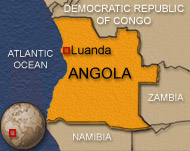New facets for Africa diamond industry
Diamond tycoon Lev Leviev has shaken up Africa’s diamond industry by setting up two pioneering projects to cut and polish rocks that are mined on the continent locally.

In barely 15 months, the Lev Leviev Diamonds Group singlehandedly established the diamond cutting and polishing industries in Namibia and Angola from scratch, creating jobs for about 1000 local workers.
African diamonds normally are sent overseas – for cutting and polishing – to Antwerp in Belgium and other countries such as Israel and India.
“For over 100 years since diamonds are mined in Africa, those countries have not had any part in getting value added to this important resource,” the Russian-Israeli Leviev said at an international diamond conference in Namibia last week.
“This was done to prevent the development of any significant local diamond industry in Africa,” Leviev said.
World diamond supplies
From 1987 to 1995, the diamond tycoon was a “sightholder” – an exclusive group of about 90 diamond traders – of South African mining giant De Beers, which controls roughly 70% of the world’s diamond supplies.
 |
|
Diamond cutting and polishing |
Last week Leviev blasted the “sightholders” as an “exclusive club of yes-men” who kowtow to De Beers.
Leviev, 50, who according to Forbes magazine is probably worth $2 billion, has since 1996 pumped millions of dollars into diamond concessions in Angola and Namibia and in the past 15 months opened two diamond cutting and polishing factories in Namibia and Angola.
“We will expand to the value-adding chain here in southern Africa where the diamonds are mined by setting up a jewellery factory and branding these diamond products worldwide,” Leviev told Angolan President Eduardo dos Santos in Luanda.
18-month training
Yaakov Adir, investment director in the Leviev Group, said about 600 Namibian and 300 Angolan diamond cutters and polishers were trained in merely 18 months.
“In Angola, over half of them are physically disabled people and war victims,” Adir told AFP, referring to the southern African country that is emerging from a nearly 30-year civil war.
“They were mostly unemployed and can now feed their families,” he said.
 |
|
A diamond factory was opened |
“The planned diamond jewellery factory for Namibia will be up and running by the first half of 2006,” he said.
With southern African diamond producing countries opting for local value adding against the decades-old practice of shipping rough stones abroad, Leviev seems to have made the right moves at the right moment.
“Leviev moves very fast,” says Windhoek-based economist Robin Sherbourne, adding: “The Leviev group is a major competitor to De Beers.”
The publicity-shy Leviev wants to create wealth in Africa, Adir said.
“He sees it as his mission to invest in Africa so that its people benefit from diamonds produced in their own countries,” he said.